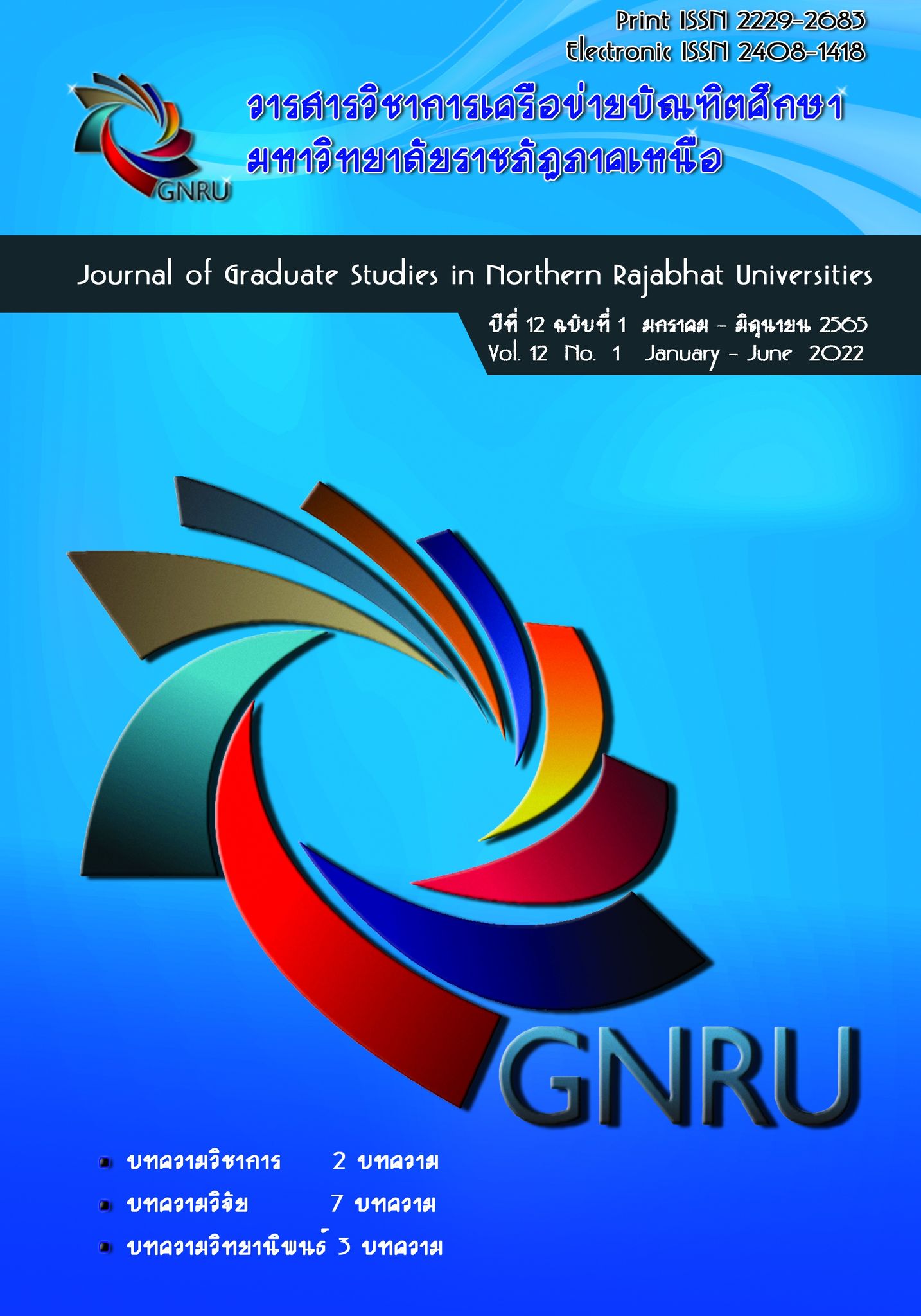รูปแบบการจัดการเรียนรู้บูรณาการสหวิชาการสำหรับครูยุคใหม่สร้างเด็กไทย 4.0 สำหรับนักเรียนช่วงชั้นที่ 3 The Integrated Interdisciplinary Learning Management Model for Teachers in Development Thai Children 4.0 for Grade 7-9 students
Main Article Content
Abstract
The objectives of this research were: 1) to develop the integrated interdisciplinary learning management model for teachers in development Thai children 4.0 for grade 7-9 students, 2) to experiment the integrated interdisciplinary learning management model for teachers in development Thai children 4.0 for grade 7-9 students, and 3) to evaluate the integrated interdisciplinary learning management model for teachers in development Thai children 4.0 for grade 7-9 students. The researcher was followed the 3 research phases: phase 1 was to develop the integrated interdisciplinary learning management model by recruiting teachers to receive practical training and cooperate with model development base on constructivism. The model were evaluated the quality by 5 experts. Phase 2 was the experimental stage of the integrated interdisciplinary learning management model, the samples were 17 students in Matthayom suksa 1 at Nakhon Sawan Rajabhat University Demonstration school, academic year 2020. They were obtained by using cluster random sampling technique. The experiment took 10 weeks and the evaluation of students’ Achievement and the scientific problem solving ability. Phase 3 was the evaluation stage of the integrated interdisciplinary learning management model, the evaluation were based on the adapted the evaluation standard criteria of The Joint Committee on Standards for Education Evaluation and students’ satisfaction on activities participation by questionnaire with 5 rating scales. The research results show that, 1) The outcome of designing the integrated interdisciplinary learning management model for teachers in development Thai children 4.0 the development based on the Problem base learning in Bueng Boraphet for 3 times per week (2 hours per time) total 10 weeks. The evaluation of the integrated interdisciplinary learning management model were on the highest quality according to experts’ evaluation. 2) Achievement and scientific problem solving ability of students who participated had statistical significantly higher than before at the 0.01 level. 3) They were agreed that the integrated interdisciplinary learning management model for grade 7-9 students were on the highest quality, and students’ satisfaction with integrated interdisciplinary learning management were on the highest
Article Details
References
เกรียงศักดิ์ เจริญวงศ์ศักดิ์. (2550). กรุงเทพเมืองน่าอยู่. (พิมพ์ครั้งที่ 2). กรุงเทพฯ: บริษัทซัคเซส มีเดีย.
เจษฎายุทธ ไกรกลาง. (2560). การจัดการเรียนรู้โดยใช้รูปแบบปัญหาเป็นฐานต่อการส่งเสริมผลสัมฤทธิ์ทางการเรียนและความสามารถในการคิดแก้ปัญหาทางวิทยาศาสตร์ของนักเรียนชั้นมัธยมศึกษาปีที่ 3. (วิทยานิพนธ์ปริญญามหาบัณฑิต). มหาสารคาม: มหาวิทยาลัยราชภัฏมหาสารคาม.
ฉัตรทริกา ศรีรักษา. (2561). การพัฒนากิจกรรมแนะแนวด้วยการจัดการเรียนรู้แบบปัญหาเป็นฐาน (PBL) เพื่อส่งเสริมความสามารถการแก้ปัญหาเชิงสร้างสรรค์ สำหรับนักเรียนชั้นมัธยมศึกษาปีที่ 4. (วิทยานิพนธ์ปริญญามหาบัณฑิต) มหาสารคาม: มหาวิทยาลัยราชภัฏมหาสารคาม.
ชำนิ จิตตรีประเสริฐ. (2543). พัฒนาคุณภาพด้วยความคิดสร้างสรรค์. (พิมพ์ครั้งที่ 2). นนทบุรี: สถาบันพัฒนาและรับรองคุณภาพโรงพยาบาล.
ดอกอ้อ รังโคตร. (2553). ผลการจัดกิจกรรมการเรียนรู้วิทยาศาสตร์ โดยใช้ปัญหาเป็นฐาน (PBL) เรื่อง ปรากฎการณ์เกี่ยวกับอากาศในชีวิตประจำวัน ชั้นมัธยมศึกษาปีที่ 1. (วิทยานิพนธ์ปริญญามหาบัณฑิต) มหาสารคาม: มหาวิทยาลัยมหาสารคาม.
ทิศนา แขมมณี. (2555). ศาสตร์การสอน : องค์ความรู้เพื่อการจัดกระบวนการเรียนรู้ที่มีประสิทธิภาพ. กรุงเทพฯ : จุฬาลงกรณ์มหาวิทยาลัย.
ธีระเกียรติ เจริญเศรษฐศิลป์. (ผู้บรรยาย). (28 สิงหาคม 2561). การศึกษาไทย 4.0 ในบริบทการจัดการศึกษาเพื่อการพัฒนาที่ยั่งยืน. กรุงเทพฯ: ศูนย์ประชุมวายุภักษ์ โรงแรมเซ็นทราศูนย์ราชการและคอนเวนชั่นเซนเตอร์ แจ้งวัฒนะ.
นิจวรรณ พิมคีรี. (2555). การศึกษาความสามารถในการแก้ปัญหา เรื่อง กัมมันตภาพรังสี และ พลังงานนิวเคลียร์ของนักเรียนชั้น มัธยมศึกษาปีที่ 4 โดยการจัดการเรียนรู้แบบใช้ปัญหาเป็นฐาน (PBL). (วิทยานิพนธ์ปริญญามหาบัณฑิต) ขอนแก่น: มหาวิทยาลัยขอนแก่น.
นิสา นามเดช. (2558). การเปรียบเทียบผลสัมฤทธิ์ทางการเรียนและความสามารถในการแก้ปัญหาทางวิทยาศาสตร์ เรื่อง แรงและการเคลื่อนที่ กลุ่มสาระการเรียนรู้วิทยาศาสตร์ ชั้นมัธยมศึกษาปีที่ 3 ระหว่างการจัดกิจกรรมการเรียนรู้โดยใช้ปัญหาเป็นฐาน (PBL) กับการจัดกิจกรรมการเรียนรู้แบบปกติ. (วิทยานิพนธ์ปริญญามหาบัณฑิต) ชัยภูมิ: มหาวิทยาลัยราชภัฏชัยภูมิ.
พัชรา พุ่มพชาติ. (2552). การพัฒนารูปแบบการจัดประสบการณ์การแก้ปัญหาอย่างสร้างสรรค์สำหรับเด็กปฐมวัย. (วิทยานิพนธ์ปริญญาดุษฎีบัณฑิต). นครปฐม: มหาวิทยาลัยศิลปากร.
วิจารณ์ พานิช. (2555). วิถีสร้างการเรียนรู้เพื่อศิษย์ในศตวรรษที่ 21. (พิมพ์ครั้งที่ 4). กรุงเทพฯ: ตถาตาพับลิเคชัน
สิริพร ปาณาวงษ์. (2559). รายงานการวิจัยเรื่องการพัฒนากิจกรรมการเรียนรู้ “ลดเวลาเรียน เพิ่มเวลารู้ โดยใช้โรงเรียนเป็นฐาน. นครสวรรค์: มหาวิทยาลัยราชภัฏนครสวรรค์.
Chain, C. and Chia, L. (2015). Problem-Based Learning Tools. Washington, 75(8),44-60.
Leary, H.M. (2012). Self-directed Learning in Problem-based Learning Versus Traditional Lecture-based Learning: A Meta-analysis. Doctoral dissertation, Utah: Utah State University.
Leman, V. and Burcin, A. (2007). Problem-based learning in an eleventh grade chemistry class: factors affecting cell potential. Research in Science and Technological Education, Abingdon. 25(3), 351-369.
MCKinley, K. (2012). Using Problem Based Learning and Guided Inquiry in a High School acid-based Chemistry Unit. Doctoral dissertation, Michigan: Michigan State University.


